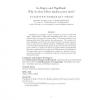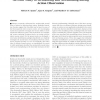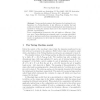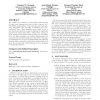1931 search results - page 74 / 387 » Why we blog |
IM
2007
13 years 8 months ago
2007
PageRank is a popularity measure designed by Google to rank Web pages. Experiments confirm that PageRank values obey a power law with the same exponent as In-Degree values. This ...
ICRA
2010
IEEE
13 years 7 months ago
2010
IEEE
Abstract— While the most accurate solution to off-line structure from motion (SFM) problems is undoubtedly to extract as much correspondence information as possible and perform g...
JOCN
2011
12 years 11 months ago
2011
■ Humans commonly understand the unobservable mental states of others by observing their actions. Embodied simulation theories suggest that this ability may be based in areas of...
SOFSEM
2012
Springer
12 years 4 months ago
2012
Springer
Abstract. Various methods exists in the literature for denoting the configuration of a Turing Machine. A key difference is whether the head position is indicated by some integer ...
CIKM
2007
Springer
14 years 2 months ago
2007
Springer
We consider the problem of content-based spam filtering for short text messages that arise in three contexts: mobile (SMS) communication, blog comments, and email summary informa...




